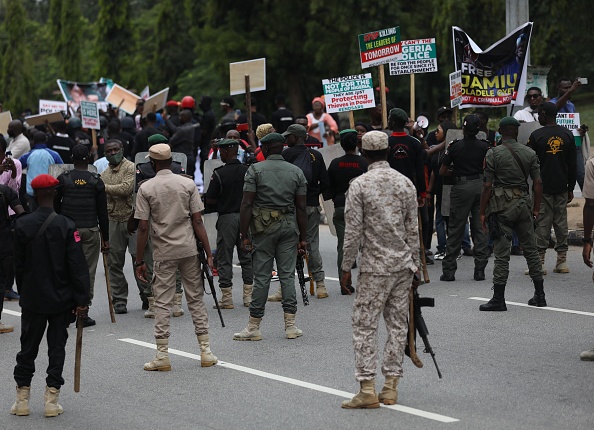Lagos – A preliminary report by a commission probing the deaths of Nigerian protesters last year has found the army shot and “killed unarmed” demonstrators in a crackdown that could be considered a “massacre”.
The report contradicts Nigeria’s army, which denies troops opened fire with live rounds during the October 2020 #EndSARS protests in Lagos, where rights activists say at least 10 peaceful demonstrators were killed.
The protests initially erupted over police brutality, but spread into the largest anti-government demonstrations in the modern history of Africa’s most populous nation.
The independent judicial commission had been set up by Lagos state government to investigate the crackdown at the city’s Lekki tollgate, the epicentre of the #EndSARS protests.
ALSO READ | A year after mass protests, Nigerian police brutality has ‘resumed’
“At the Lekki Toll Gate, officers of the Nigerian Army shot, injured and killed unarmed helpless and defenceless protesters, without provocation or justification,” the commission said in one of its key findings, according to a copy of the report seen by AFP.
“The manner of assault and killing could in context be described as a massacre.”
The report also said police assaulted protesters, leading to deaths, and had attempted to cover up the incident by removing bullets from the scene.
The report, which was supposed to be confidential until the state government releases it, was also leaked to local Nigerian press.
One commission member and a Lagos state government official confirmed the authenticity of the report.
Activists welcome report
Lagos state attorney general and other state officials must now present the actions they will take on the commission’s recommendations.
Activists involved in the protests applauded the initial findings.
“Shattered so many lives, tried to destroy mine. Only for what you desperately tried to hide to be made public… by you!” DJ Switch, one of the protest organisers who was at Lekki and later went into exile, said on Twitter.
“The truth needs no defence!”
ALSO READ | Nigerian youths protest a year after bloody crackdown
Moe Odele, a lawyer who helped coordinate the protests, wrote: “#LekkiMassacre happened”.
The crackdown on protesters triggered international condemnation and the release of the judicial commission’s report had been widely anticipated.
The US embassy in Nigeria welcomed the findings, saying it was an “important mechanism of accountability” about an incident that led to serious accusations against the security forces.
“We look forward to the Lagos State and federal governments taking suitable measures to address those alleged abuses as well as the grievances of the victims and their families.”
Blank rounds
Among the commission’s recommendations were sanctioning troops and police involved in the shootings, police training reforms and a public apology and compensation for victims of Lekki.
Amnesty International said at the time of the Lekki tollgate incident at least 10 people were shot dead by security forces.
The army has said that only blank rounds were fired to disperse a crowd at Lekki that was breaking a night-time curfew.
The commission’s report noted 11 people killed, four more missing, presumed dead, and a further 21 wounded by gunshots from the Lekki site.
“The panel finds that the firing of live bullets by the army at genuine protesters at the Lekki Toll Gate on October 20, 2020, resulted in grievous injuries and the loss of lives of the protesters.”
ALSO READ | Still no justice for survivors from Nigeria crackdown, says rights body
The commission said police officers also tried to cover up their actions by picking up bullets at Lekki.
“The panel also found that the conduct of the Nigerian Army was exacerbated by its refusal to allow ambulances render medical assistance to victims,” it said.
“The army was also found not to have adhered to its own rules of engagement.”
Last month, Nigeria’s Information Minister Lai Mohammed dismissed claims that troops shot and killed peaceful protesters, saying “there was no massacre” at the tollgate.
Lagos State Governor Babajide Sanwo-Olu has promised a proper response to the panel’s recommendations, adding that its decision would be published within the next two weeks.
Last month, activists and protesting youths held one-year memorial protests in Lagos and in the capital Abuja under heavy police watch.
Follow African Insider on Facebook, Twitter and Instagram
Source: AFP
Picture: Getty Images
For more African news, visit Africaninsider.com


